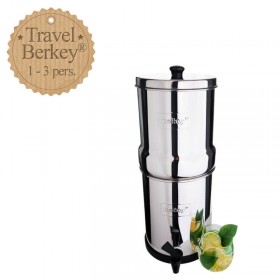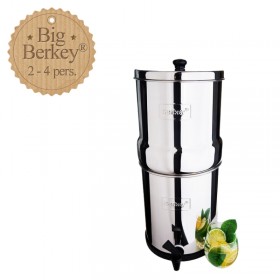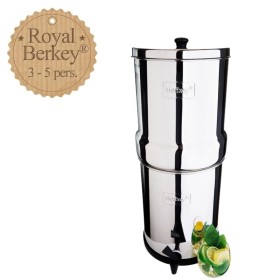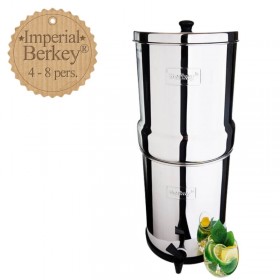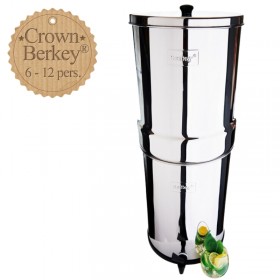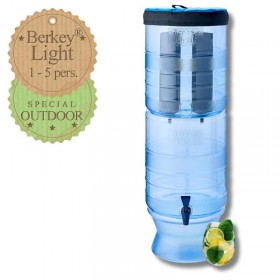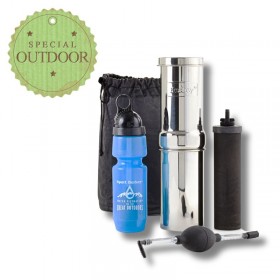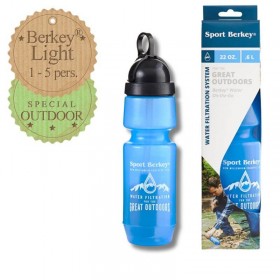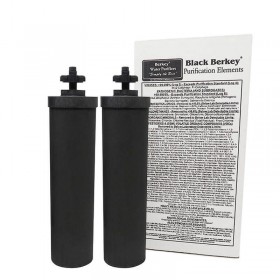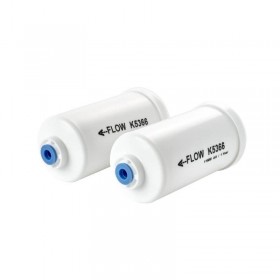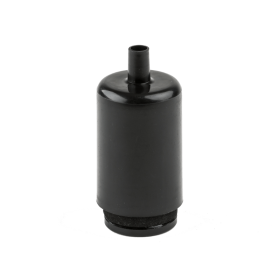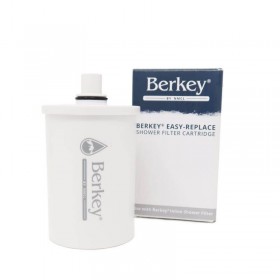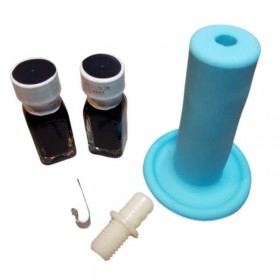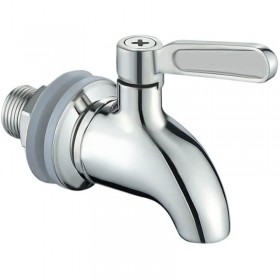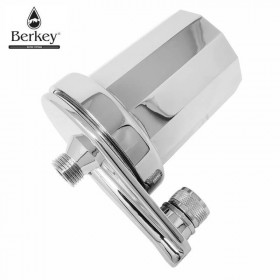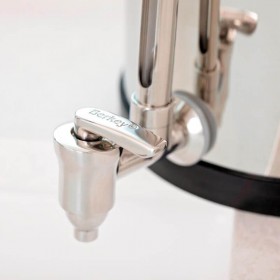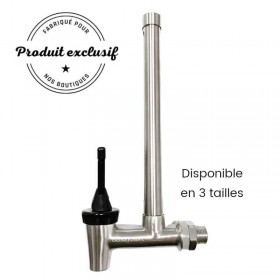Black Berkey® filter elements
The composition of the Black Berkey® elements used in Berkey® water purifiers is a unique formulation protected by a patent. It is based on the mix of six different and specific types of media, which includes high-quality activated carbon. Compiled in a very compact matrix containing millions of microscopic pores, they create a "tortuous path" through which water can pass, but contaminants cannot. These channels are so thin that all undesirable elements are inevitably trapped. With a process of absorption and adsorption, submicron viruses are also blocked, something other water filters cannot do without the use of chemicals.
The cylinder of activated carbon is impregnated with an ion-exchange resin. The activated carbon adsorbs or chemically binds to organic compounds, such as solvents and petroleum-based fuels, a large number of pesticides, and numerous pharmaceuticals. The ion-exchange resin eliminates many dissolved metals from the water by exchanging toxic heavy metals (like lead, mercury, and cadmium) for lighter and inoffensive metals (like sodium, the main component of table salt). All this enables a comprehensive and highly efficient filtration.
Additionally, the manufacturer Berkey® New Millennium Concept Ltd. confirms that graphene oxide is not used in the composition of Black Berkey® filters.
More details can be found on the page explaining the functioning of Berkey® water filters.
That's correct! Silver is used as an antimicrobial agent allowing each Black Berkey® element to self-sterilize. Analysis were conducted by an independent laboratory to guarantee that the silver used does not dissolve into the purified water, and this is precisely the case. The analysis concluded: "All control samples, including stock samples, positive and negative analytical controls, and the begative control collected prior to seeding yeilded appropriate results and were accepted. The results of the leaching control samples (effluent sample spiked with MS2 and R.nterrigena and analyzed at two time points) were quite similar, suggesting that no active antimicrobial agent is leaching into the treated water."
You can view the complete report results (in English).
Yes, and it is the same for all Berkey products, including the Berkey® Light and
Berkey® Sport. No BPA is present in any part.
This is true, water that filters through the Black Berkey™ elements tends to be more basic than before being filtered. Its pH increases a bit. And in reality, this is a good thing... Pathogenic bacteria and viruses thrive in acidic environments and struggle to survive in alkaline environments. The higher the pH, the greater the alkalinity.
However, it is important to remember that the final pH level of the treated water can depend on other factors, like the pH level of the water before being filtered.
It is important to distinguish between plastics that dissolve in water and present a health risk and those that exist as miniscule solid particles.
In the first group, among the plastics that are dangerous to health and can dissolve in water, the most widespread are Bisphenol A (BPA) and 1,1-Dichloroethane (11-DCA). We are pleased tp say, the Black Berkey™ filters can remove these two harmful plastics.
Additionally, thanks to the filtration capability ranging from 24 to 26 nanometers, solid microplastics are also eliminated. These measure approximately 2.5 microns (2500 nanometers), which is significantly bigger than the 24 nanometers of the filter.
The micropores that constitute the Black Berkey™ filters are so fine that they stop microparticles such as viruses and bacteria from passing through. Even food colouring cannot pass through, and the filtered water becomes crystal clear!
Viruses and bacteria are eventually trapped in these extremely fine "tortuous paths" (in the range of a few microns), where as the smaller water molecules (H2O) are not.
This method efficiently distinguishes contaminants from purified water.
For more details on filtration capacity, you can consult the complete test results.
Glyphosate is a herbicide and pesticide used in modern agriculture and primarily released into the environment via runoff water. Numerous analyses have proven that the molecule is everywhere and is found in the hair, blood, and urine of an increasingly large population.
Its presence is also increasingly common in drinking water. The Black Berkey™ purification elements reduce glyphosate in your water by over 75%, exceeding the limits defined by laboratories.
You can review the analysis results* concerning Black Berkey® water filters, and more specifically those related to pesticides*.
(*) Documents in English.
With the growing consumption of medicines, an increasing number of contaminants from pharmaceutical residues are being released into the natural environment and finish in tap water. Among these can be found endocrine disruptors such as Bisphenol A, anti-inflammatories such as naproxen, octylphenols, progesterone, hormonal treatments like HRT, and many more. Thankfully, the Black Berkey™ water filters have the capability to filter these substances, making your drinking water healthier.
You can read the full analysis* from tests conducted by independent laboratories.
The Black Berkey™ filters have been tested to eliminate up to 99.9% of these petroleum-based contaminants:
- Gasoline
- Diesel
- Crude oil
- Kerosene
- Refined oil
Find the full laboratory results for Black Berkey® purification elements here.
Yes! The Black Berkey™ filtration elements have been tested to eliminate more than 99.8% of chromium 6, as this form is the most dangerous for humans (see page on the dangers of chromium 6).
Chromium exists in different forms, some toxic and some not. For those interested, here are detailed explanations about chromium.
In summary, chromium comes from two distinct sources: trivalent (chromium 3+) and hexavalent (chromium 6+).
Trivalent chromium (C3) is a beneficial mineral for humans in trace quantities and is present in food.
Hexavalent chromium (C6), however, is a toxic form resulting from industrial pollution: used in metal coatings (such as stainless steel), pigments and dyes, wood preservation products, and tanning processes.
Not all filters are the same, and the removal of heavy metals does not necessarily mean that chromium 6 is eliminated. The Black Berkey™ filter is effective against this source of pollution as proven by these test results.
Giardiasis and cryptosporidiosis are both infections caused by protozoan parasites (giardia lamblia and cryptosporidium parvum) that affect the gastrointestinal tract. While giardiasis is often mild, cryptosporidiosis is a serious intestinal illness. These infections are commonly provoked from the ingestion of food or water or food contaminated with the feces of infected animals or humans.
Diarrhea, gas, nausea, and cramps are common symptoms of giardiasis and cryptosporidiosis. The parasites are often found in outdoor water sources like lakes, streams, and swimming pools.
The Black Berkey® filters eliminate over 99.996% of cryptosporidium and have been proven to decrease the amount of Giardia cysts by more than 99.994%, as confirmed by these test results.
Leptospirosisis caused by bacteria of the genus Leptospira. Considered as a serious infection, it is transmitted through the urine of infected animals, and is spread by the ingestion of contaminated water or food.
Cases range from mild to severe with flu-like symptoms in milder cases, but some extreme cases with severe symptoms such as kindey damage or liver failure can be fatal.
The Black Berkey™ purification elements have been proven to decrease the amount of Leptospira bacteria by over 99.6%, based on contamination levels far higher than those typically found in nature.
Find more information on leptospirosis below.
Read the test results proving the effectiveness of Black Berkey® filters against leptospirosis*.
A number of minerals can be present in water in the form of dissolved ions, either negatively charged (anions) or positively charged (cations). These ionic forms are absorbable by the human body. Among these minerals are calcium (Ca++), carbonates (CO3--), bicarbonates (HCO3-), chlorides (Cl-), potassium (K+), magnesium (Mg++), sodium (Na+), nitrates (NO3-), and sulfates (SO4--).
The media in the Black Berkey™ filters is not designed to eliminate these beneficial minerals (in their ionic forms) from the water. They may indeed be reduced if they are highly concentrated, but the majority will pass through the filters and be present in your filtered water.
If you still wish to incorporate additional minerals to your water, we recommend liquid additives and adding them into the lower chamber of your Berkey® system to avoid reducing their concentration.
Finally, we are frequently asked about the dry residue rate after filtration. The answer to this is easy: if you understand that the mineral concentration remains the same before and after filtration, the dry residue level also stays the same and entirely depends on the water you filter.
The Black Berkey™ filters are standard equipment in Berkey® purification systems, the industry leader in gravity-fed water purifiers. Each filter is designed to purify approximately 11,300 liters of water before replacement. A pair of Black Berkey® filters in a Berkey® system will purify about 22,600 liters of water before we recommend replacing them. The Black Berkey® purification elements are sold in pairs and can be used to upgrade most gravity-fed water filter systems. They are washable and self-sterilizing and come with a proportional 2-year warranty.
You can also find the installation and use instructions for the Black Berkey® purification elements* as well as the video explaining the priming of Black Berkey® water filters.
To simplify the priming of Black Berkey® elements, Berkey® has created a priming pump. Check out the information regarding the Black Berkey Primer® pump.
The Black Berkey Primer™ is a manual pump that makes priming of Black Berkey™ filter elements easier without the need for tap pressure or when the space under the tap si too small for priming.
Priming the Black Berkey® purification elements is essential to expel air and saturate the filters with water before use.
The Primer™ pump also allows you to purge the Black Berkey® elements with air to clean the porous structure of the filter if necessary and to dry the filters for long-term storage (see information on storing Black Berkey® filters for details).
The Primer pump therefore allows you to:
1- Eliminate debris that can build up in the filter pores during use,
2- Reduce the time that is necessary to dry the filters before storage,
3- Facilitate the priming of the elements when water pressure is not accessible or when space under the tap is limited.
4- Black Berkey® filters should never be primed with contaminated water. This is the case, for example, if you only have access to reclaimed water such as rainwater, borehole water, well water, etc. You must prime them with the Black Berkey® Primer pump. It is an essential tool in these conditions.
The Black Berkey Primer™ is especially designed for use with Black Berkey® purification elements.
Find here the Black Berkey Primer™ instructions for use To complement this information, you can watch a video on using the Black Berkey Primer™.
The Black Berkey™ water filters do not necessarily need to be cleaned every time you clean your Berkey® water purifier. However, this depends on the quality of your water. If you live in an area where the water is significantly dirtier than usual, more frequent cleaning of the elements may be necessary to remove debris that can clog the pores of your Black Berkey® purification elements.
Regarding the frequency of cleaning the filters, it can be estimated that it is necessary when you notice that the flow rate starts to decrease significantly. For hard water, cleaning should be done every month. In other cases, set a maximum limit of 4 to 5 months to avoid reaching the point where the filters are completely clogged.
How to clean your filters?
1. Start by emptying and disassembling the Black Berkey® purification elements from the Berkey® system. Use a cleaning pad similar to a Scotch Brite pad (abrasive side) and scrub the exterior of the Black Berkey® purification elements under running (cold) water.
2. Reprime the filters.
3. Reassemble the Black Berkey® purification elements in your Berkey® system and proceed with a new filtration by filling the upper chamber.
Each Black Berkey® water filter is designed to filter and purify approximately 11,350 liters of water before needing replacement. The pair of elements that equips all Berkey® systems (except the Go Berkey®, which has only one) will filter and purify about 22,700 liters of water before needing to be changed.
This equates to about 10 years of use for two Black Berkey® filters in a system serving a family of four, each consuming 1.5 liters of water per day.
Example calculation to determine when to change the filters in a Big Berkey® system:
The Big Berkey® has a capacity of 8.5 liters. If the system is fully filled once a day, the calculation will be as follows: 22700 / 8.5 / 365 = 7.3 years
This formula can be adjusted according to your model and daily filling habits to determine how often you will need to change your filters.
Important note: The theoretical lifespan may vary depending on the water you filter. Not all water is equally loaded with contaminants. Therefore, this theoretical lifespan is not universal and depends entirely on the composition of each type of water and the maintenance given to the filters.
You can also apply this formula to PF-2 filters based on their theoretical filtration capacity of 3,800 liters.
1- If you have already used your filters
The storage method will vary based on the duration for which the Black Berkey® water filters will be out of use:
- If the period of non-use is less than 3 days, no special action is required.
- If the period of non-use is more than 3 days and less than 15 days and you want to avoid the re-priming process, remove them from the system, place them in a sealed plastic bag, and store the filters in the refrigerator, ensuring that they do not freeze. This will keep the filters saturated with water and avoid re-priming. If you find that they are filtering more slowly than usual when you put them back into use, re-prime them until water droplets form on the outside of the filter walls.
- For longer-term storage, we recommend drying and sealing the filters. The most important thing is to ensure they are completely dry before storing them to prevent bacterial growth. One way to dry your filters out completely is to leave them on a windowsill for one to three days. We also offer a priming and purging device called the Black Berkey Primer™. The advantage of purging the Black Berkey® purification elements is that they dry very quickly. When the filters are dry, place them in a tightly sealed plastic bag. Black Berkey® filters are extremely powerful and can absorb odors and smoke in the air. When you are ready to use them again, clean them by scrubbing the exterior with a Scotch-Brite® pad or a stiff brush. Then re-prime the filters manually or with the Black Berkey Primer™ before placing them back in the system.
** Please note that the above storage methods apply only to Black Berkey® purification elements. See below for PF-2 filters.
2- If you have never used your filters
If the filters are unopened and still in their original packaging, be careful not to store them in an place with strong odors, such as a laundry room or garage. The elements contain activated carbon, which allows them to absorb odors from the storage area. Avoid storing them near highly scented items such as soap or laundry detergent.
In theory, the shelf life of Black Berkey® purification elements is limitless.
When storing the stainless steel tanks of your Berkey® system, it is best to empty them completely, as stagnant water can harbor bacteria. We recommend washing your Berkey® system with soapy water before allowing to dry.
Two scenarios are possible:
1- If you have just acquired your Berkey® water purifier and the filters are new, the problem is usually due to high water tension. This prevents air from being purged from the micropores of your Black Berkey® water filters. Your filtration elements must be purged of this air to allow water to pass through them. A beige priming washer/blue valve and priming instructions are provided with the Black Berkey™ elements. Remove your filters, prime them, then reinstall them in your Berkey®. This should resolve the slow flow rate issue.
2- If the flow rate slows considerably during the use of your Berkey® system, the problem can usually be resolved by cleaning the elements. Turbidity and clogging of the micropores by sediment are usually the cause of this issue. Just remove the elements from your system and scrub the exterior of each element with the abrasive side of a ScotchBrite® sponge. Scrub a section of the element until you see some black on the sponge, then move to another section until you have scrubbed around each element. This process should only take a few minutes and should only be done under running water. Re-prime each element, then reinstall them in tank. Your flow rate should be back to normal.
CAUTION: Never use soap, vinegar, detergent, or any other cleaning product.
The exclusive design of the Black Berkey® filtration and purification elements compensates for the amazingly small pore size by using an exponentially greater number of micropores in each element. It is for this reason that Black Berkey® water filters produce about 8 times more water per hour than other rival elements. Even though some surface pores may become clogged by contaminants, it is very difficult to clog all the pores and therefore block the filter completely. Towards the end, you may see a slowdown in the filtration rate, but never a total blockage. If this occurs, the filter can be cleaned by simply scrubbing the exterior of the element with a ScotchBrite® pad or a toothbrush. This will remove the particles clogging the surface pores of the filter.
In conclusion, even though the filters have very fine micropores, the filter will not block prematurely.
The filtration capacity of Black Berkey® purification elements is defined by their effectiveness in reducing heavy metals. After filtering this volume of water, it is possible that some of these heavy metals may pass through the filter. Nevertheless, their effectiveness on other pollutants remains intact well beyond the 11,300 liters.
Nonetheless, for safety, it is best to stick to this theoretical capacity and change the filters once this volume of water is has been filtered.
It all depends on the type of softener used. For example, CO2 or magnetic water softeners produce water that is normally fit for consumption (confirm with the manufacturer) and do not pose a problem with Berkey® systems.
However, the most commonly used water softeners work with ion exchangers that convert calcium and magnesium, which are responsible for scale buildup, into sodium. The use of these softeners produces soft but salty water...
The Black Berkey® water filters are designed to eliminate a large number of contaminants as stated in the test results conducted by an independent laboratory. However, they do not remove the minerals originally present in the water and conserve them for the benefit of our bodies. The residual sodium from softened water, present in high concentrations, will not be filtered by the Berkey® system and will end up in your drinking water. Unlike natural mineral salts, this sodium is highly concentrated and is obviously not desirable to consume.
These synthetic salts can also clog the micropores of the filters, which will slow down or even stop the filtration. This could require very frequent maintenance of the filters.
Therefore, for these systems, we do not recommend using softened water from a salt-based water softener to fill your Berkey® purifier. Non-recommended use will invalidate the filter warranty.
Note: Some installations are equipped with a by-pass to draw off the water before it passes through the softener. If this is the case, there is no problem using this water for your Berkey water purification systems
The washers are made of food-grade neoprene rubber. Additionally, no components used in Berkey® systems contain any harmful substances. For example, there is no trace of BPA in Berkey® products.
Regarding the washers, keep in mind that they never come into contact with the filtered or purified water.
The World Health Organization states that the below sources are not advisable to use as drinking water:
- Water from radiator circuits, hot water tanks (domestic heating systems)
- Water from toilet bowls or flush tanks
- Water from in waterbeds
- Water from swimming pools and spas
The chemicals and contaminants often found in swimming pools are many and most are toxic: pH+, pH-, alkalinity adjustment (bicarbonate of soda, muriatic acid, sodium bisulfate), calcium hardness increase, chlorine, bromine, biguanide, cyanuric acid, ammonia, bacteria and other pathogens, algae, insects, and animal waste...
The presence and levels of these chemical contaminants depend on numerous factors, including the type of pool, the type of disinfectants used and their dosage, the bather load, temperature, and pH.
Although Black Berkey® filters have been rigorously tested by independent third-party laboratories for the removal or reduction of numerous contaminants (herbicides, heavy metals, chlorine, chloramine, pathogenic bacteria, parasites, pesticides, perfluorinated acid compounds, petroleum products, pharmaceuticals, radiological products, trihalomethanes, viruses, and volatile organic compounds...) and even though the test data shows that chlorine concentration decreases by more than 99.9%, it is not recommended to filter water from your pool with Berkey® systems for frequent consumption.
This water could contain contaminants or chemicals other than those tested, for which there is no factual data regarding their safety.
Limescale is actually a form of calcium called calcium carbonate. Not only is it rich in calcium but also in dissolved magnesium (essential minerals for health). Calcium is naturally present in water. It enters into the water when it passes through the soil before being pumped and made drinkable. Limestone is a natural element, and tap water can provide up to 25% of the daily calcium intake. So why would you want to eliminate it?
Well, Berkey® filters do not eliminate it! The mineral salts remain present in the filtered water for your well-being, unlike pollutants which are removed.
However, if deposits build up in the tanks due to very hard water, it is best to occasionally clean them with white vinegar and warm water, for example. As for the filters, they can, according to recommendations, be scrubbed on the outside with a soft brush or a Scotch-Brite® sponge to clean them and remove any blocked pores but only with water!
Black Berkey® water filters used in Berkey® purification systems are entirely capable of filtering collected water.
However, certain precautions are necessary. For instance, ensure that there is no contamination by a specific pollutant that might be absent from the test results conducted by Berkey®. Also, take care to limit the contact of animal feces (birds, squirrels, etc.) with your water or chemicals used on roofs. The water should be pre-filtered before being introduced into the purifier to avoid excessive suspended matter, which could quickly block the filters and they would need cleaned more often.
Some of our customers have built rainwater filtration systems consisting of multi-stage capture processes (up to 5 stages in some systems) equipped with several Black Berkey® filter elements (from 4 to 8). The water is filtered in a number of stages and stored in adequate containers.
Even though Black Berkey® elements are water purifiers, it is advisable, for this type of use, and if, for example, there is a risk of high contamination by E. coli, add a few drops of (unscented) chlorine-based disinfectant at the first stage of filtration.
See this topic on filtering water from sources other than tap water.
What are estrogenic compounds?
Estrogenic compounds are part of a larger category of chemicals known as endocrine disruptors, chemicals that are able to alter the hormonal and homeostatic system that allows an organism - such as a human or other animal - to connect with and interact with its environment.
What types of estrogens are found in drinking water?
The main types of estrogens in our water supply include estrone, estradiol, estriol, and particularly synthetic ethinylestradiol (EE) from medications like contraceptive pills. Ethinylestradiol is the most widely used oral active estrogen globally. However, many other chemicals in wastewater effluents also have estrogenic effects on our bodies, like dihydrofolliculin, octylphenol, nonylphenol, polyethoxylates, trihalomethanes, and bisphenol A.
Effectiveness of Berkey® filter
In general, activated carbon filters can eliminate a wide range of endocrine disruptors, including steroidal estrogens and many estrogenic substances like trihalomethanes (THMs), which form when chlorine used to disinfect water reacts with natural organic matter. Black Berkey® purification elements have been successfully tested for reducing progesterone, octylphenol, nonylphenol, THMs, and BPA (see test results). Although estrogen was not specifically tested, we can suppose that it is also removed based on tests on similar endocrine disruptors.
A conductivity meter or TDS pen can be purchased for at low cost on major online selling websites. These meters are deceptively presented as water quality testers, whereas they only demonstrate the water's conductivity.
The conductivity of water is directly proportional to the amount of dissolved solids in the water, that is, mineral salts in their ionic form (and not organic matter or various pollutants). Thus, the higher the concentration of dissolved minerals and trace elements, the higher the conductivity.
These devices cannot detect the presence of pollutants or contaminants, nor can they make a conclusion about the purity of the water.
The concentration shown by these meters before filtration corresponds only to the content of dissolved minerals in ionic form in your water.
Finding the same measurement before and after filtration indicates that the mineral salts were not retained, which is the goal of Berkey® filtration. This measurement in no way questions the efficiency of Black Berkey® or Sport Berkey® filters and is not proof of malfunctioning of your purifier.
If your measurement is higher after filtration, this means that the filters have not been cleaned properly and that some residual dust remains after the filters have been machined. It will tend to decrease over time.
For further details, you can read the full article on our BLOG.
Congratulations! This indicates your Black Berkey© filters have been perfectly primed!
The water gently trrickles through as soon as you fill the upper chamber. It is the weight of the water column that forcefully pushes the water through the filters. Once the water column decreases (between the last third and the halfway point), the water drips quickly.
What makes the Black Berkey® filters strong and efficient are the microchannels that take a tortuous path, allowing the water to contact the filter over a long distance. But since there are millions of these microchannels, in the end the water filtered very quickly.
Generally, a full chamber is filtered in 45 minutes, give or take 10 minutes. If this is not the case, it means your filters are not properly primed. You should then re-prime them according to the instructions provided in your manual.
If you find that the filtration is very fast (10 to 20 minutes), again, don’t worry! The filtration speed indicated by the manufacturer is an average, and very fast filtration does not indicate that your filters are not working. First, check that your black seals are properly installed in the upper chamber and that the blocking plugs are securely in place and tight (except for the Travel model). Also, make sure the wing nuts are sufficiently tightened (without over-tightening). After that, when the water is being filtered, check by lifting the upper chamber that the water flows only through the ends of the Black Berkey® filter stems. Finally, if after all these checks the filtration is still very fast, you can perform a red dye test following the instructions in your manuals or in our FAQ. This is the final step that will find out if your filters are working properly or not.
The question has been frequently asked over the past few months. First and foremost, it is important to have informed and factual information on the subject. If you are asking this question, you have probably read alarming articles on the topic. We invite you to read this article from AFP to help balance the information.
The manufacturer, Berkey® New Millennium Concept Ltd., confirms that graphene oxide is not used in the composition of Black Berkey® filters.
Furthermore, if the water to be filtered contained this component, NMCL does not have tests to verify its reduction by the Black Berkey® elements. Without test results, we cannot determine if the elements are capable of reducing or removing it.
It should be noted, however, that the filtration fineness of Black Berkey® elements is about 22-24 nanometers. Any molecule larger than this measurement is mechanically trapped and thus retained by the filters.
First, have you properly primed your bottle to eliminate any dust in the filter? If not, refer to your manual and complete or repeat the priming step.
If the taste persists, here is a little tip to remove the odor. Take the container (without the straw or filter), fill it partially with white vinegar (about 1/5 to 1/3 of its capacity) and top it up with hot water. Let it sit overnight, rinse thoroughly, and then let it dry. As it dries, vinegar has the unique ability to remove odors (including its own).
This is quite normal, as the filters are always more or less tilted due to their weight and their single fixing point at the bottom of the tank.
This has no effect on filtration.
All you need to do is position the black gaskets correctly on the upper tank side and the butterfly nuts correctly on the lower tank side.

